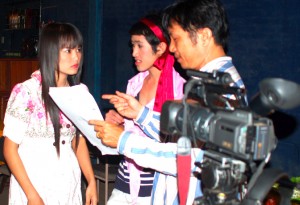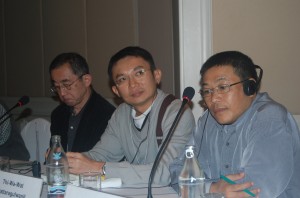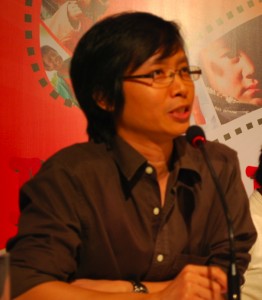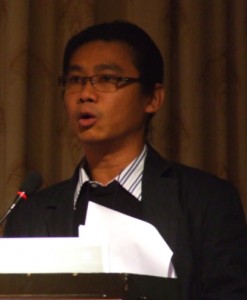Tag Archive | "mekong"

Tags: gender, health, mekong, pandemics
Flash Report Day 3: Thinking Gender, Reporting Health
Posted on 11 December 2009 by admin
Comments Off

Tags: China, media, mekong
Day 2: MMF Gives Space for Debate (including on China)
Posted on 11 December 2009 by admin
Comments Off
Tags: cartoonists, media, mekong
How to Be Funny – and Make People Think
Posted on 10 December 2009 by admin
By Lynette Lee Corporal
Cartoonists and photojournalists usually let their work speak for them, so when they actually meet with their audiences, expect to see a Standing Room Only crowd.
In a session on ‘The View from Cartoonists and Photojournalists’ that elicited both chuckles and pensive silence from the audience at the Mekong Media Forum, cartoonists, illustrators and photojournalists from Thailand, Burma, China and Japan talked about how they mix art with social commentary.
Comments Off

Tags: Burma, Burma election 2010, media, mekong
Exiled Media Brace for 2010 Vote
Posted on 10 December 2009 by admin
By Marwaan Macan-Markar
A promised election in military-ruled Burma next year will be held in a vastly different media culture than the last general election in 1990, Burmese journalists said at the Mekong Media Forum.
That election was won convincingly by the opposition, but the junta refused to recognise its results.
The 2010 polls in Burma will be held against the backdrop of the abundance of media outlets run by exiled Burmese journalists that have mushroomed in the last two decades, says Kyaw Zwa Moe, managing editor of ‘The Irrawaddy’, a popular current affairs magazine produced by Burmese journalists living in Thailand.
“In the run-up to the1990 (election), no publications inside the country were free to cover elections, and there was no exiled Burmese media,” he told participants Thursday at a regional media forum held in this northern Thai city. “The media inside still faces danger to report independently about the elections.”
Consequently, the “exiled media has an important role to play,” he told more than 100 participants at a session on ‘Burma 2010’ at the Mekong Media Forum here, which runs from Dec. 9-12. “It has grown strong in recent years.”
‘The Irrawaddy’ has set up a special series under the theme ‘Election Watch’ to cover different aspects of the elections before, during and after the vote.
Burma’s junta has said the nationwide vote is part of its agenda to create a “disciplined, flourishing democracy”.
“We need to watch every step of the elections,” political activist Moe Zaw Oo, another panelist on the session, said about exploring how the media inside and outside the country will cover elections that will have not the usual ways of ensuring transparency and openness of popular votes. “It will be very tricky and complicated,” given that independent media will not be inside the country to report on the vote.
Media representing Burma’s ethnic minorities, such ‘Kachin News’ produced by Kachin journalists exiled in Thailand, are also preparing for the vote. “A new form of people’s groups have been set up in the Kachin area,” says Naw Din Lahpai, editor of the publication. “A brand new office of the (pro-junta) Kachin State Progressive Party was inaugurated on November 18th.”
The junta is also trying to rope in the churches in the Kachin area in northern Burma, majority of whom are Christians. “Churches have been gifted with rice, cooking oil and small cash donations,” Naw Din said. “A campaign based on religious organisations has been launched.”
Already, the exiled media are hammering away at the uncertain and oppressive political landscape that prevails, producing stories that ask how free and fair the South-east Asian nation’s upcoming poll will be. The election is only the 15th in the country’s history since it emerged from British colonial rule.
But in truth, the military leaders of Burma, officially called Myanmar, have still to formally announce two important laws that will make the poll a reality — one setting the 2010 election date and the law governing political parties that will vie for seats in the legislature.
The reasons to worry about the poll are ample. In May 2008, days after Burma’s Irrawaddy Delta was flattened by the Cyclone Nargis, the junta conducted a referendum riddled with fraud. It said 90 percent of voters endorsed the new constitution in the plebiscite.
How the 1990 elections turned out – where some 15 million voters turned out — also feed media concerns. The National League for Democracy, led by Nobel Peace laureate Aung San Suu Kyi, secured over three-fourths of the seats in the national assembly, only to be denied power by the regime.
The regime’s reluctance to hand over power to a civilian authority – which Burma has not had since the 1962 military coup – is reflected in the constitution that, the regime states, is part of its seven-point roadmap towards political reform and democracy.
“The constitution is totally flawed. It favours military supremacy,” said Moe Zaw Oo, who writes for the ‘Irrawaddy’. “The military has the power to stage a coup at any time they want. They can do so using the state of emergency, and this act is not illegal.”
The regime’s attempt to retain its grip on power has also been cemented by another constitutional provision that guarantees the military a fourth of all the seats in the legislature through appointments – and not through polls.
For Burma’s ethnic minorities, which account for over 40 percent of the country’s 56 million people, a ruthless military campaign makes “the regime’s planned elections meaningless,” said Charm Tong of the Shan Women’s Action Network.
“We now have 600,000 internally displaced people inside Burma,” she told the forum, referring to the plight of the country’s ethnic minorities. “The Shan state has over 150 battalions stationed out of Burma’s 500 battalions, which is a fourth of the military strength.”
Many Shan political leaders have been jailed, including some who won convincingly at the 1990 poll, added the activist from the Shan ethnic minority. Said Charm Tong: “These stories cannot be ignored ahead of the elections.”
Comments Off

Tags: Laos, media, mekong
Lao TV Drama Brings Migration Risks to Life
Posted on 10 December 2009 by admin
By Joel Chong

Thanks to the inclusion of young volunteers and migrants in the cast and crew, a Lao television mini-drama series
about the lives and struggles of young migrants who freely cross the border turned out to be just the right vehicle for getting their attention to migration and its risks. Continue Reading
Comments Off

Tags: media, mekong
Day 2: Perceptions of China, Reporting on Burma
Posted on 10 December 2009 by admin
On the 2nd day of the Mekong Media Forum, debates around perceptions of China through media reports continued to stand out. Journalists discussed how to report on the 2010 election in Burma — if it is held. Continue Reading
Comments Off

Tags: children, mekong, Mekong media forum
Getting Children’s Voices Out
Posted on 10 December 2009 by admin
Comments Off

Tags: Burma, media, mekong
‘Mekong Media Should Ask Tougher Questions’
Posted on 09 December 2009 by admin
By Tess Bacalla
CHIANG MAI, Thailand, Dec 9 (TerraViva) – Countries in the Mekong region have indeed opened their borders and former foes become friends, but several of them are still ruled by authoritarian governments that put limits on media and other freedoms.
Aung Zaw, exiled Burmese editor of ‘The Irrawaddy’ magazine, stressed this contrast during in his opening remarks at Wednesday’s opening of the Mekong Media Forum in this northern Thai city, where he has lived and fought for Burma’s freedom since fleeing the repressive state 21 years ago as a student activist.
In this kind of environment – where openness has filtered through all economies in the region but not necessarily into their political environments — the founder and editor of the magazine focusing on Burmese and South-east Asian issues said journalists need to raise fundamental questions to authorities lest they remain buried and allow the region’s repressive regimes to remain in power unchallenged. Continue Reading

Tags: media, mekong
Burma, Children and Media Trends
Posted on 09 December 2009 by admin
Comments Off

Tags: media, mekong
Chinese Dams Expose Fault Lines
Posted on 09 December 2009 by admin
By Marwaan Macan-Markar
CHIANG MAI, Thailand, Dec 9 (TerraViva) – A heated debate about the future of the Mekong River at a media conference in this northern Thai city exposed a fault line triggered by the regional giant China’s plans to build a cascade of dams on the upper stretches of South-east Asia’s largest waterway. Continue Reading

Organised by


Major Supporters:


Other Supporters and Media Partners
Photos from our Flickr stream
See all photos
-
CATEGORIES
- Heard & Overheard (1)
- Mekong Media Forum (2)
- News (24)
- Top Story (4)
- Video (12)
-
ARCHIVES
- December 2009 (42)





